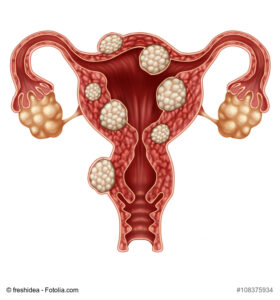So many women in this country get unnecessary hysterectomies! Every year, about 600,000 American women undergo this procedure. (And some estimates say 33% of all women in the U.S. will have a hysterectomy by the time they turn 60!)
Many of these women want surgery. They see it as the only way to relieve fibroid symptoms. In fact, that was the case for actress Viola Davis, who recently revealed she had a hysterectomy to end years of fibroid suffering. Years ago, Davis says she had myomectomy surgery to remove 33 fibroids. But her growths returned, and Davis ultimately opted for a more dramatic surgery. In fact, she revealed to Yahoo news that she told her doctor, "If I wake up and my uterus is still here, I'm going to kick your a**."
For Davis, this was the right choice, at least in her own heart and mind. But many women choose hysterectomy because they think it's their only option for addressing fibroids. And that's scary news, since a hysterectomy (the complete removal of your uterus) is a really big deal. But are there cases when hysterectomies are a must? Let's take a closer look!

As we said, with a hysterectomy you lose your uterus. But there are different versions of this surgery. In an oophorectomy, doctors remove your ovaries. And with salpingectomy, you only lose your fallopian tubes. Need a hysterectomy with bilateral salpingo-oophorectomy? That means your uterus, fallopian tubes and ovaries all have to go.
You may need a partial, total or radical hysterectomy. Partial hysterectomies preserve your cervix. Total hysterectomies don't. And radical hysterectomies take your whole uterus, cervix and the top part of your vagina.
There are several different ways to perform a hysterectomy. The procedure your surgeon uses will depend on your individual needs. Options include going through your vagina or your abdomen. Or, in some cases, you could have a laparoscopic hysterectomy. That means your doctor could perform this procedure through a tiny incision, using minute telescopes to help see your uterus and safely remove it.
Do 600,000 women a year REALLY need to lose their uterus? As minimally invasive fibroid treatment specialists, we know the answer is "no." So why is this procedure so common? Unfortunately, a lot of factors play into the over-prevalence of hysterectomies.
First, this procedure has been around for years. So surgeons feel very comfortable performing hysterectomies. And they typically know what the surgical outcome will be, meaning less chances of unpleasant surprises. In contrast, less invasive options such as UFE are relatively new. Many doctors still aren't familiar with these techniques, so they are less likely to recommend them as options.
And the problem doesn't stop there. Research suggests that Black women are four times more likely to have a hysterectomy than White women. And they have hysterectomies more often than women of any other race. Yes, this could be tied to the higher incidence of fibroids in women of color. But it also has lots to do with healthcare inequality in this country. Which is something we can't allow to keep happening.
Hysterectomies are appropriate when you're facing a life-threatening condition. So, if you have cancers of the uterus, fallopian tubes, cervix or vagina, you may need one. It may be necessary if a woman's uterus ruptures during childbirth, or if her post-delivery bleeding is life-threatening. In some cases, women with severe PID (pelvic inflammatory disease) will need this surgery. (PID described an infection or inflammation in your uterus, fallopian tubes and/or ovaries. It affects about 12% of women, and can be contracted through sex or after getting an IUD, or a D&C following an abortion or miscarriage. If treated early, PID is easy to clear. But when left untreated, it can cause serious complications, including a necessary hysterectomy.)
So, that's when you really need a hysterectomy. But there are other times when hysterectomies are also considered. Many women with fibroids and endometriosis are told they need to remove their uterus to get relief. And, while this may sometimes be true, other women can avoid this major surgery with less invasive treatment options. In our opinions, as Houston fibroid specialists, if there are treatments that could help women avoid hysterectomies, that should be the first line of defense. Except in cases of emergency, hysterectomies should be the last option your physician recommends.
Looking to treat your fibroids with a less invasive option? Our Houston area fibroid specialists are here to help! Schedule a consultation with our team, to see if you're a good candidate for an alternative to hysterectomy!
Sources: CDC, Shape Magazine
As leading fibroid specialists in Houston, we can help you get back to doing the things you love – free of pain and symptoms associated with this diagnosis.

Scheduling
Please contact our dedicated specialists to schedule a consultation today.
2025 Houston Fibroids. All rights reserved. Website Design by Healthcare Success